在目录 kernel26_h/drivers/usb/host/ohci-s3c2410.c 文件中将下面函数的内同修改为
static void s3c2410_start_hc(struct platform_device *dev, struct usb_hcd *hcd)
{
struct s3c2410_hcd_info *info = dev->dev.platform_data;
//======
unsigned long upllvalue = (0x38<<12)|(0x02<<4)|(0x01);
unsigned long upllvalue1 = (0x38<<12)|(0x02<<4)|(0x02);
dev_dbg(&dev->dev, "s3c2410_start_hc:\n");
//=====
__raw_writel(upllvalue,S3C2410_UPLLCON);
mdelay(20);
__raw_writel(upllvalue1,S3C2410_UPLLCON);
mdelay(20);
//=====
clk_enable(clk);
mdelay(10);
if (info != NULL) {
info->hcd
= hcd;
info->report_oc = s3c2410_hcd_oc;
�
if (info->enable_oc != NULL) {
(info->enable_oc)(info, 1);
}
}
}
主要功能是在 USB 寄存器初始化的之前给它较高的频率,等初始化完成后在将频率恢复为正常
的 48MHZ。
linux-2.6.28 系统移植 s3c6410 开发板 USB 不能识别的处理
初始化 OK,一插上 usb 就报如下错误:
/ # usb 1-1: new full speed USB device using s3c2410-ohci and addr
ess 2
usb 1-1: device descriptor read/64, error -62
usb 1-1: device descriptor read/64, error -62
usb 1-1: new full speed USB device using s3c2410-ohci and address
3
usb 1-1: device descriptor read/64, error -62
usb 1-1: device descriptor read/64, error -62
usb 1-1: new full speed USB device using s3c2410-ohci and address
4
usb 1-1: device not accepting address 4, error -62
usb 1-1: new full speed USB device using s3c2410-ohci and address
5
usb 1-1: device not accepting address 5, error -62
hub 1-0:1.0: unable to enumerate USB device on port 1
解决方法:
�
根据终端打印的错误
cd
include/asm-generic/errno.h
u-boot/include/asm-arm/errno.H
找到:
#define
ETIME
62
/*timer
expired*/
再由:
error-codes.txt 去找 usb
error
code
http://ftp.gnu.org/tmp/linux-libre-fsf2_2.6.28/linux-2.6.28/D
ocumentation/usb/error-codes.txt
-ETIME
(**)
No
response
packet
received
withi
n
the
prescribed
may
instead
be
bus
turn-around
time.
This
error
reported
as
-EPROTO
or
-EILSEQ.
由此可以判断,这个错误与 USB 设备超时有关。报告这个错误的地方在
drivers/usb/core/hub.c 中的 hub_port_init 部分,由于
usb_get_device_descriptor 获取 usb 设备资讯的时候产生了超时,这
样基本可以确定三种情况,1.USB 设备及介面有问题,2、usbcore 有问
题 3、usb
driver 有问题。
�
我们可以很容易的派出 1.2 的可能性,问题应该在
usb
driverimplement 部分造成。2.6 的内核 usb
driver 把 usb 规范
中对 usb 的操作集中到了 core 里面,针对不同设备的 implement 分别
归为 host、gadget、storage 等。基本确定问题就在 ohci-s3c2410.c
中。
原来是 USB Host 的 48MHz 时钟没有起来。
s3c6410 支持三个 PLL 分别是 APLL,MPLL 和 EPLL。APLL 为 ARM
提供时钟,产生 ARMCLK,MPLL 为所有和 AXI/AHB/APB 相连的模块
提供时钟,产生 HCLK 和 PCLK,EPLL 为特殊的外设提供时钟,产生
SCLK。
如图所示为 EPLL_CON 的 M、 P 和 S 的取值。
根据 s3c6410 的数据手册:
�
如图所示,描述的是用于 IrDA 和 USB host 的时钟发生器,通常 USB
借口需要 48M 的操作时钟。
从图中可也以说明,HCLK_GATE,PCLK_GATE 和 SCL_GATE 控制时
钟操作。如果一个位设置,则通过每个时钟分频器相应的时钟将会被提
供,否则,将被屏蔽。
HCLK_GATE 控制 HCLK,用于每个 Ips。每个 IP 的 AHB 接口逻辑被
独立地屏蔽,以减少动态电力消耗。PCLK_GATE 控制 PCLK。通过
SCLK_GATE 时钟被控制。
根据上图 EPLL 通道写出一下程序。
0
(0<<20)
(1<<30)
((1<<2)|(1<<5))
58 #define EPLL_CON01
359
360 #define UPLL_SRC_MASK ((1<<2)|(3<<5))
361 #define UPLL_SRC
362 #define UPLL_DIV1_MASK (0xf<<20)
363 #define UPLL_DIV1
364 #define UPLL_GATE_MASK (1<<30)
365 #define UPLL_GATE
void set_upll(void)
368 {
369
370
371
372
373
374
375
376
unsigned int tmp;
while(__raw_readl(S3C_EPLL_CON0)!=EPLL_CON00)
__raw_writel(EPLL_CON00,S3C_EPLL_CON0);
while(__raw_readl(S3C_EPLL_CON1)!=EPLL_CON01)
__raw_writel(EPLL_CON01,S3C_EPLL_CON1);
�
while(((tmp= __raw_readl(S3C_CLK_SRC))&UPLL_SRC_
__raw_writel((tmp&UPLL_SRC_MASK)|UPLL_SRC,S
while(((tmp=__raw_readl(S3C_CLK_DIV1))&UPLL_DIV1_
377
MASK)!=UPLL_SRC)
378
3C_CLK_SRC);
379
MASK)!=UPLL_DIV1)
380
3C_CLK_DIV1);
381
E_MASK)!=UPLL_GATE)
382
S3C_SCLK_GATE);
383 }
在 probe 中加入上面的函数修改 USB host 的时钟:
__raw_writel((tmp&UPLL_DIV1_MASK)|UPLL_DIV1,S
while(((tmp=__raw_readl(S3C_SCLK_GATE))&UPLL_GAT
__raw_writel((tmp&UPLL_GATE_MASK)|UPLL_GATE,
struct platform_device *dev)
struct usb_hcd *hcd = NULL;
int retval;
386 static int usb_hcd_s3c2410_probe (const struct hc_driver *driver,
387
388 {
389
390
391
392 #if !defined(CONFIG_ARCH_2410)
393
394 #endif
395
396
然后编译内核。
usb_host_clk_en();
set_upll();
USB 的不能识别的错误就解决了
�
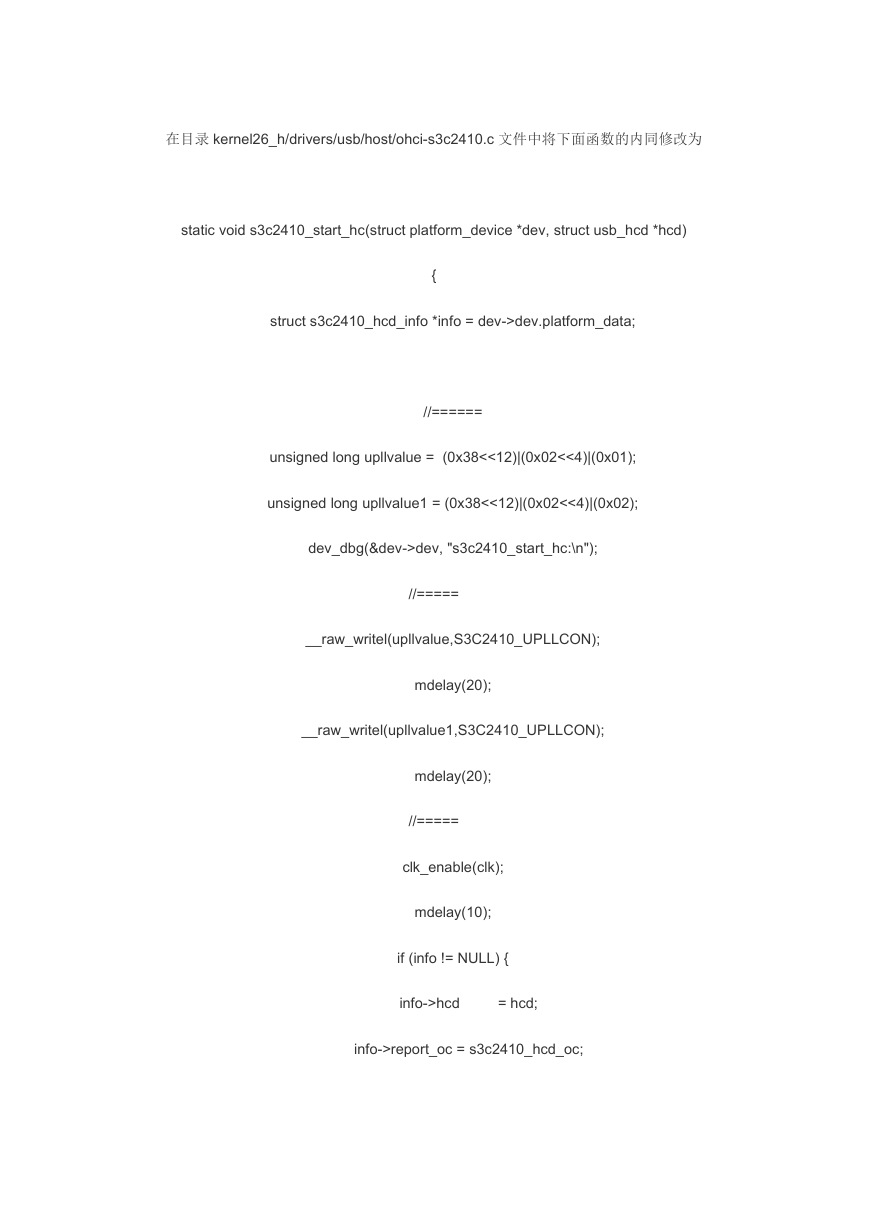
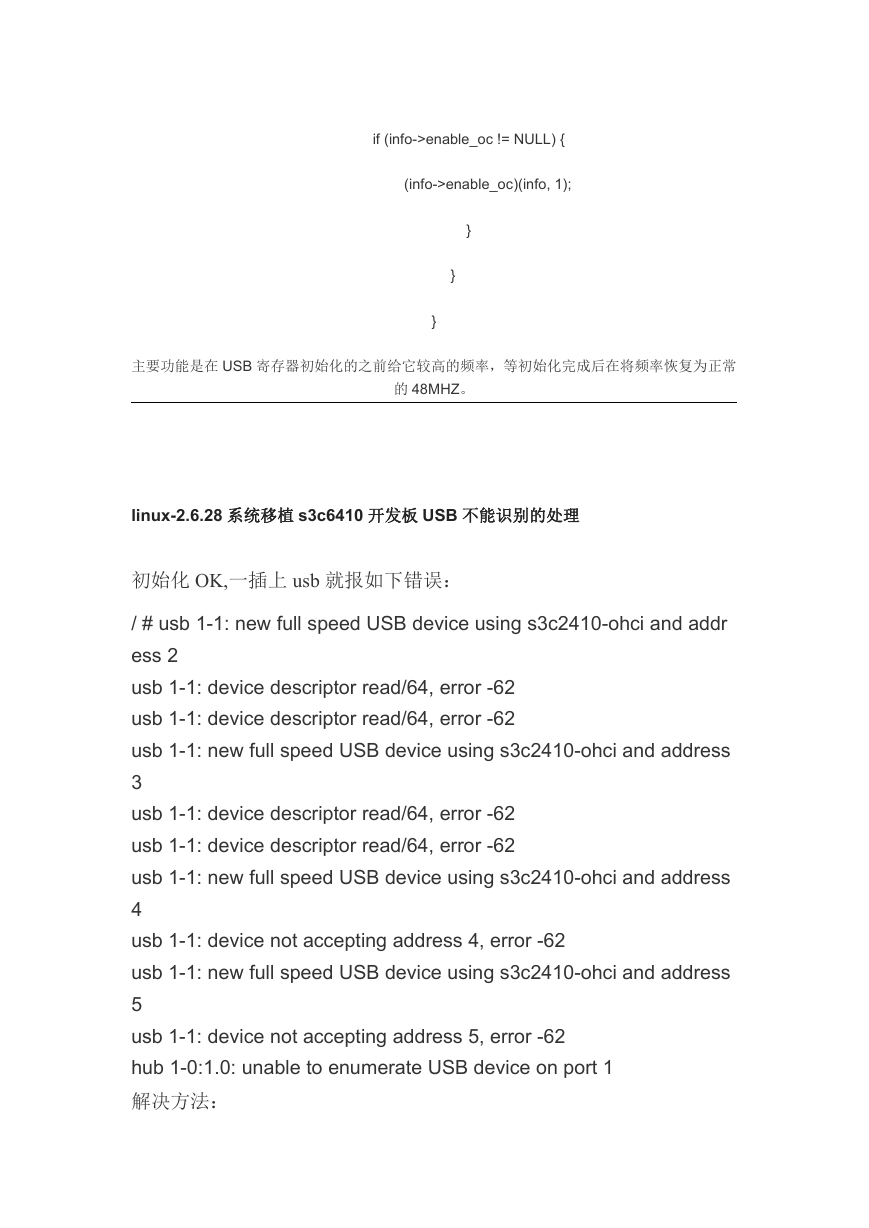
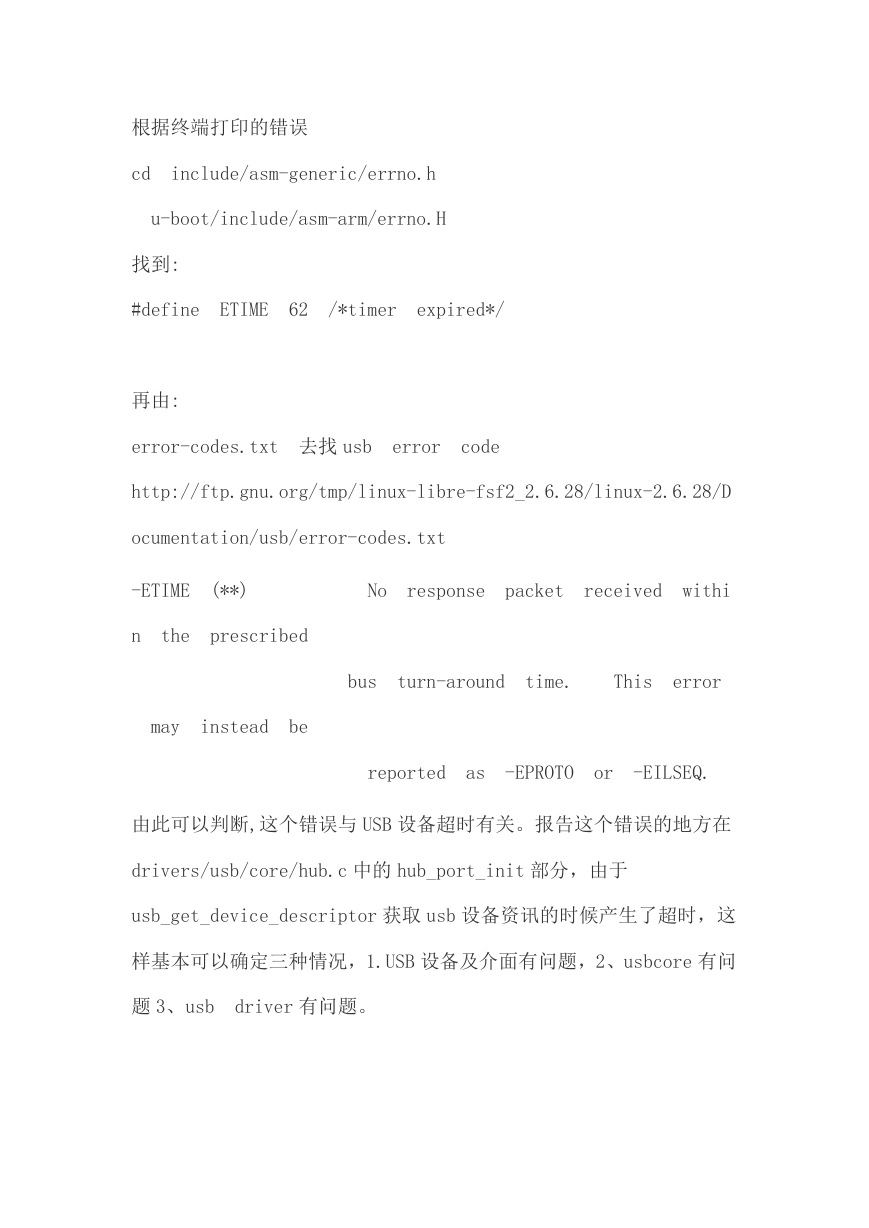
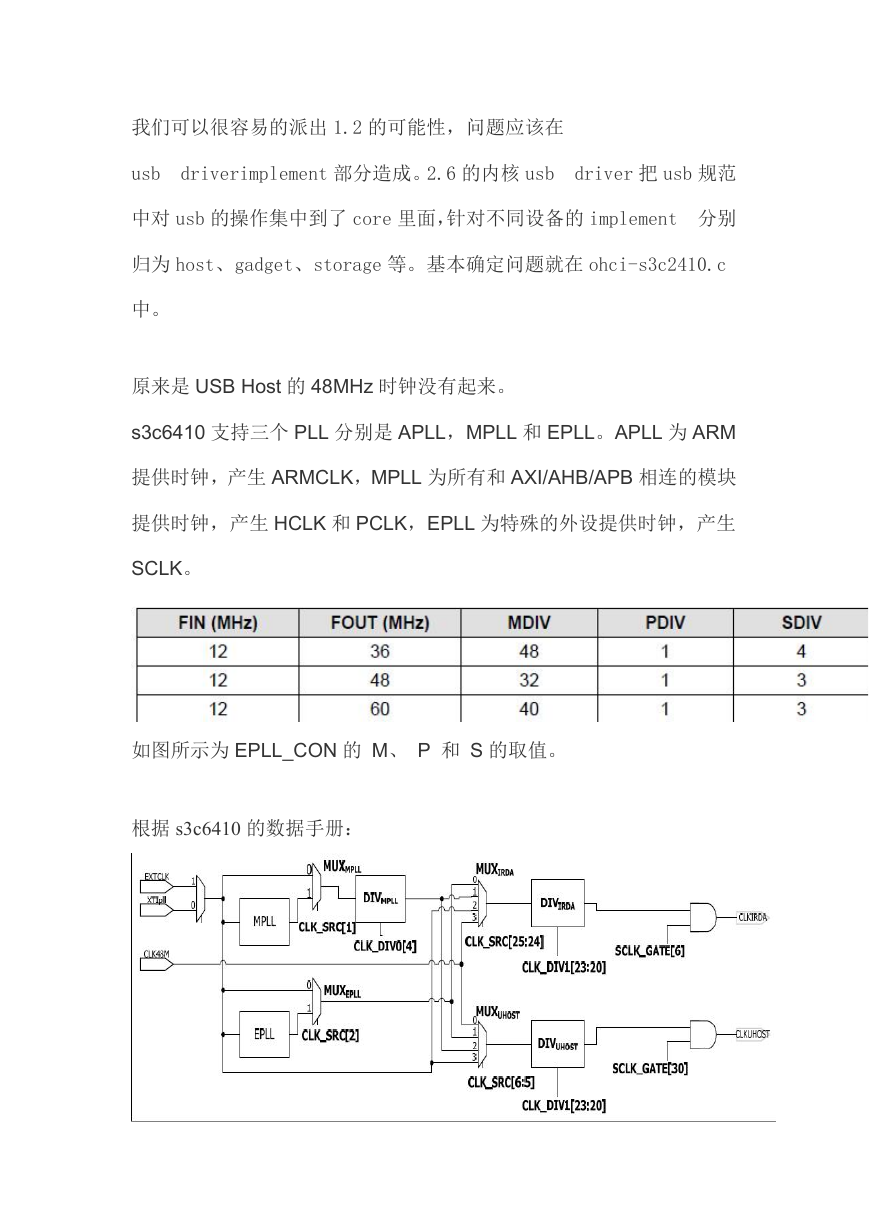
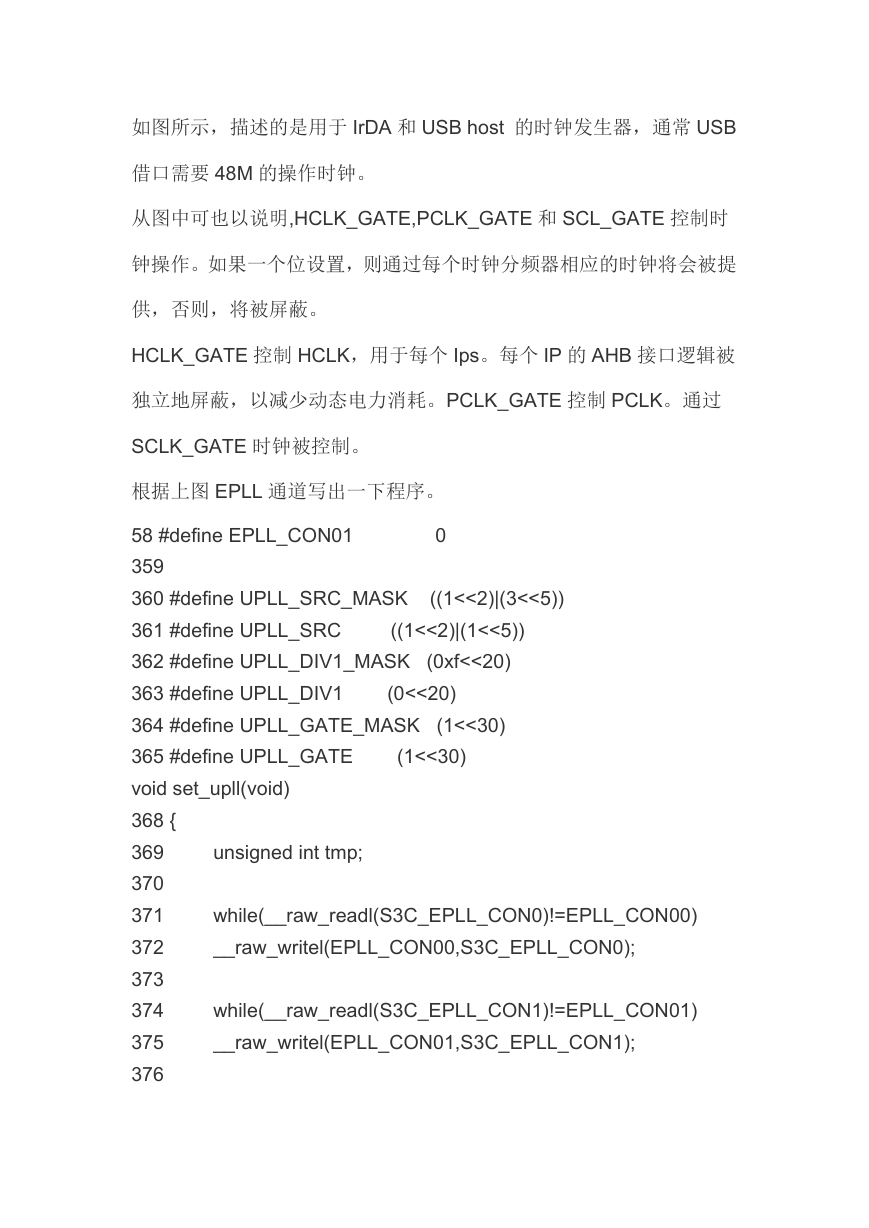
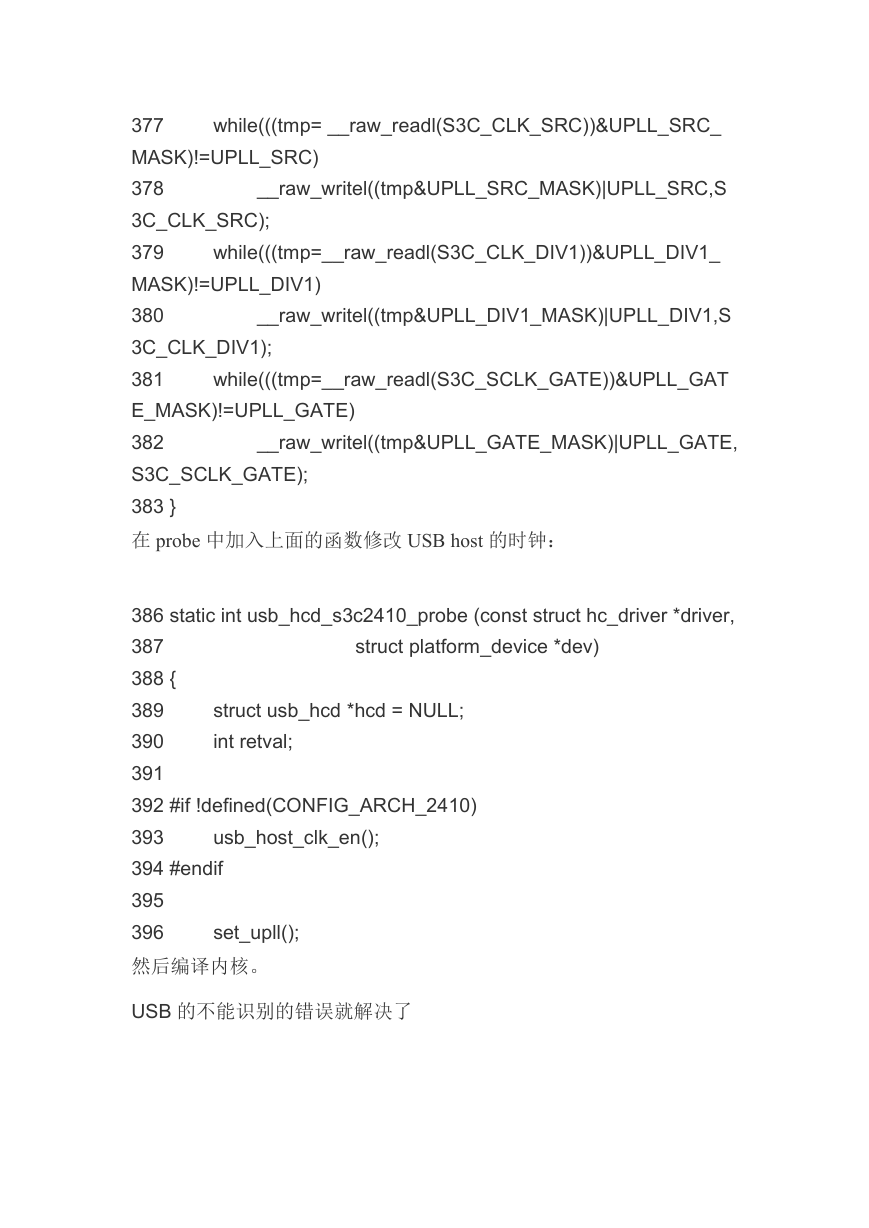






 2023年江西萍乡中考道德与法治真题及答案.doc
2023年江西萍乡中考道德与法治真题及答案.doc 2012年重庆南川中考生物真题及答案.doc
2012年重庆南川中考生物真题及答案.doc 2013年江西师范大学地理学综合及文艺理论基础考研真题.doc
2013年江西师范大学地理学综合及文艺理论基础考研真题.doc 2020年四川甘孜小升初语文真题及答案I卷.doc
2020年四川甘孜小升初语文真题及答案I卷.doc 2020年注册岩土工程师专业基础考试真题及答案.doc
2020年注册岩土工程师专业基础考试真题及答案.doc 2023-2024学年福建省厦门市九年级上学期数学月考试题及答案.doc
2023-2024学年福建省厦门市九年级上学期数学月考试题及答案.doc 2021-2022学年辽宁省沈阳市大东区九年级上学期语文期末试题及答案.doc
2021-2022学年辽宁省沈阳市大东区九年级上学期语文期末试题及答案.doc 2022-2023学年北京东城区初三第一学期物理期末试卷及答案.doc
2022-2023学年北京东城区初三第一学期物理期末试卷及答案.doc 2018上半年江西教师资格初中地理学科知识与教学能力真题及答案.doc
2018上半年江西教师资格初中地理学科知识与教学能力真题及答案.doc 2012年河北国家公务员申论考试真题及答案-省级.doc
2012年河北国家公务员申论考试真题及答案-省级.doc 2020-2021学年江苏省扬州市江都区邵樊片九年级上学期数学第一次质量检测试题及答案.doc
2020-2021学年江苏省扬州市江都区邵樊片九年级上学期数学第一次质量检测试题及答案.doc 2022下半年黑龙江教师资格证中学综合素质真题及答案.doc
2022下半年黑龙江教师资格证中学综合素质真题及答案.doc